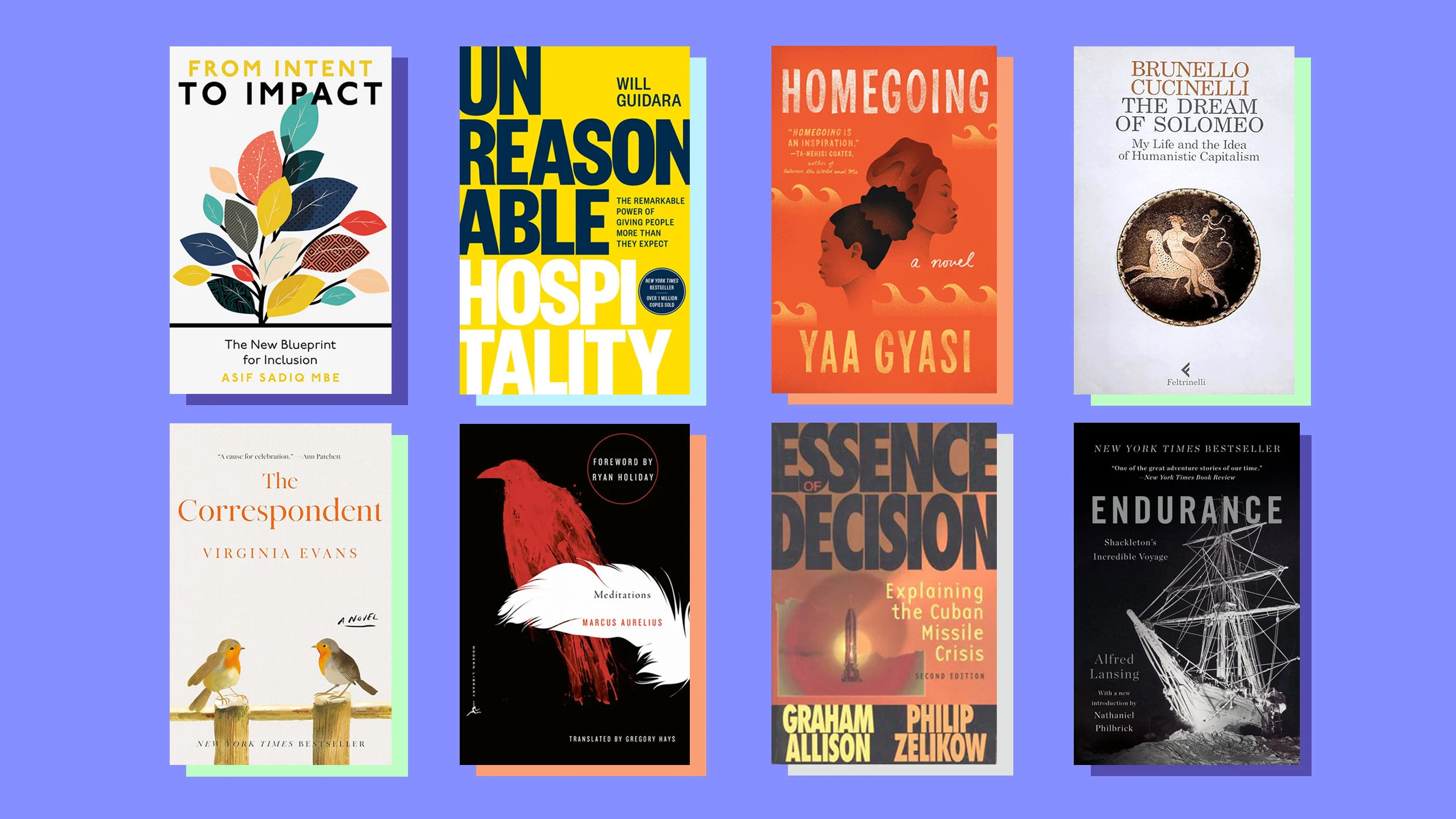#storytelling
#storytelling
[ follow ]
#comedy #leadership #authenticity #audience-engagement #empathy #b2b-marketing #linkedin #live-performance
Television
fromLondon Business News | Londonlovesbusiness.com
1 week agoWhy Marco Robinson is building a new kind of media franchise - From bestselling books to global film & television - London Business News | Londonlovesbusiness.com
Marco Robinson builds a multi-platform Start Over Movement transforming human stories into a scalable media ecosystem with books, tours, coaching, and a documentary.
fromFast Company
2 weeks ago2026 FIFA World Cup: Here's how the biggest brands are spending millions
Beer explores what he's learned from Men in Blazers co-founder Roger Bennett about how brands can leverage compelling storytelling and authentic fan culture, which sometimes matter more than the action on the field. Beer also shares insights from executives at major brands like Verizon and Anheuser-Busch about their World Cup marketing strategies to build lasting fan connections through global league sponsorships and tournament partnerships, while avoiding the "cultural wallpaper" effect that often happens at major sporting events.
Soccer (FIFA)
fromSilicon Canals
2 weeks ago7 things people do when telling stories that make others tune out immediately without realizing it - Silicon Canals
We've all been there. Someone starts telling a story, and within seconds, your mind starts wandering. Maybe you pull out your phone, suddenly remember an urgent email, or find yourself mentally reorganizing your weekend plans. The storyteller doesn't notice. They keep going, completely unaware that they've lost their audience. After interviewing over 200 people for various articles, I've noticed patterns in how people communicate their experiences. Some captivate you from the first word, while others lose you before they've even gotten to the point.
Writing
Social justice
fromNonprofit Quarterly | Civic News. Empowering Nonprofits. Advancing Justice.
2 weeks agoGrowing a Solidarity Economy | Nonprofit Quarterly | Civic News. Empowering Nonprofits. Advancing Justice.
Solidarity economy centers people and planet and needs expanded capital, responsive infrastructure, international solidarity, and compelling stories to connect and scale cooperative practices.
Marketing
fromSilicon Canals
2 weeks agoThe 5-shot formula successful content creators use to turn boring posts into stories people actually watch - Silicon Canals
Short-form videos capture attention by using a five-shot narrative formula beginning with an establishing wide shot to provide context and invite curiosity.
Brooklyn
fromBrooklyn Eagle
2 weeks agoMarcia Ely, director of public programs at the Center for Brooklyn History, brings popular live programs to the 163-year-old institution
Marcia Ely applies television storytelling and casting techniques to design public programs that make the Center for Brooklyn History accessible and relevant to Brooklyn residents.
fromPsychology Today
3 weeks agoHow Storythinking Builds Resilience and Creativity
In the "Arabian Nights" ( The Thousand and One Nights) story collection, a young Persian queen named Scheherazade prevents the king's plans to execute her by telling a succession of stories so enthralling that the king doesn't want to miss the endings. In "The Crow and the Pitcher," one of Aesop's fables, a thirsty crow can't reach the water in a tall jug, so it drops pebbles into the jug until the water rises to its beak.
Psychology
Photography
fromDesign You Trust - Design Daily Since 2007
3 weeks agoSpectacular Winning Images from The Society of Photographers' Photographer of the Year 2025
Society of Photographers' 2025 awards honored winners from nearly 6,000 submissions across 28 categories showcasing outstanding storytelling, technical mastery, and emotional depth.
fromThe Drum
4 weeks agoSo You Want My Job? Rakuten Rewards CMO Dana Marineau on building its in-house creative team
My childhood dream was to become a news anchor. I was obsessed with watching the news and inspired by women anchors such as Connie Chung and Barbara Walters. I would beg my parents to let me stay up late to watch them. I held on to that dream all the way until college. But once I took a few journalism classes, I learned something about myself that ruled it out as a career - I absolutely hated being on camera. I realized that what attracted me to journalism was storytelling and crafting a narrative that shapes how people understand and interpret the world.
fromABC7 Los Angeles
1 month agoEast Bay animation studio makes its dream come true
BERKELEY, Calif. -- As a student at NYU's Tisch School of the Arts, writer and director Alex Woo's goal was to make an animated feature film. "Every film student and every aspiring filmmaker, what they want to do is they want to make a feature film on the biggest scale. That was always the dream," Woo shares. After partnering with fellow animators Stanley Moore and Tim Hahn, Woo started Kuku Studios in Berkeley, California.
Film
fromYanko Design - Modern Industrial Design News
2 months agoHow Coca Cola's Benny Lee Is Redefining Industrial Design as Storytelling, Not Just "Making Products" - Yanko Design
Design Mindset steps into episode 16 with a clear purpose: to understand how industrial designers are navigating a world where tools, platforms, and expectations keep shifting under their feet. Yanko Design's weekly podcast, Design Mindset, powered by KeyShot, is less about design celebrity and more about design thinking, unpacking how decisions get made, how stories are built around products, and how technology is reshaping the craft from the inside out.
Design
fromNieman Lab
2 months agoThe year news gets personalized (seriously)
But in 2026, we're going to stop personalizing the menu and start personalizing the meal. The first phase will be the "easy" stuff, mostly personalization of format. If you're a commuter, you get the audio summary that lasts the exact length of your train ride. If you tend to spend the working day in your inbox, you get the newsletter bullet points. If you're a devoted flicker, you get the vertical video.
Media industry
fromBig Think
2 months agoHow life changes when you start embracing mystery
I wanted to say three extemporaneous things before I launch it in my prepared comments. The first was I wanted to thank Freethink and the Templeton Foundation. What an amazing night. I mean, I'm, I'm just like so impressed and moved and, you know, the last act, I just, I sort of wish I was on mushrooms now, and when they asked me to do this, I thought, yeah, sure.
Film
Business
fromBusiness Insider
2 months agoMrBeast reveals where he's placing his next video bets as viewers become 'numb' to spectacles and cash giveaways
MrBeast will pivot from spectacle-driven stunts to impactful storytelling, longer formats, animation, and business diversification while cutting costs and seeking sponsors.
fromwww.berkeleyside.org
2 months agoRemembering Lellingby Boyce, educator, singer, storyteller
She enjoyed a distinguished career in public education, remembered for her intelligence, articulate teaching style, and dedication to preserving history and culture. Beyond the classroom, Ms. Boyce was celebrated for her joy in singing and her beautiful operatic voice. She performed widely, bringing to life African American spirituals, operatic arias, Broadway classics, and art songs. Her recitals often included sing-alongs, inviting audiences to share in the music and storytelling traditions she cherished.
History
fromBusiness Matters
2 months agoMaryam Simpson's Clear Path to Creative Leadership
When Maryam Simpson started creating homemade magazines as a kid on her family's first computer, she didn't know she was laying the foundation for a career in digital marketing. But her love for design, storytelling, and tech never left. Today, she's a seasoned Marketing Specialist based in Hoboken, New Jersey, helping brands grow with strategy, empathy, and data. From launching rebrands to tripling client sales, Maryam's work speaks for itself. But behind every campaign is a mindset focused on clarity and connection.
Marketing
fromPsychology Today
2 months agoThe Cost of Unspoken Stories
The 2025 film Frankenstein reframes Mary Shelley's story as a narrative told across two worlds: Victor speaking on a freezing ship after being rescued, and the Creature recounting his long journey of wandering and despair. Healing Through Storytelling The film is structured through storytelling itself-Victor's tale told under duress, and the Creature's own response as a counter-story he had held inside for years. Their exchanges suggest how many relationships fracture when we fail to tell the stories that hold our pain
Film
fromSan Francisco Bay Times
2 months ago100 Nights of Hero Is a Fabulous Queer Feminist Fairytale - San Francisco Bay Times
Queer writer/director Julia Jackson ( Bonus Track) has crafted a stylish and clever queer romance with 100 Nights of Hero. The film, opening in area theatres December 5 and adapted from Isabel Greenberg's graphic novel, The One Hundred Nights of Hero, is set in a fictional medieval land where a woman's place is to marry and have sons, not to read or write.
Film
fromFast Company
2 months agoThis startup hired a sci-fi novelist to give its AI companions a soul
When Quentin Farmer was getting his startup Portola off the ground, one of the first hires he made was a sci-fi novelist. The co-founders began building the AI companion company in late 2023 with only a seed of an idea: Their companions would be decidedly non-human. Aliens, in fact, from outer space. But when they asked a large language model to generate a backstory, they got nothing but slop. The model simply couldn't tell a good story.
Books
Cars
fromDesign You Trust - Design Daily Since 2007
2 months ago"Hundai Second Star": Artist Duo Create Superb Futuristic Concept of the Hundai Car
Hyundai Second Star reimagines the Stellar as a lifestyle-focused restomod for midlife 'second act' users, emphasizing storytelling and analog design methods.
fromwww.theguardian.com
3 months agoTell us about a recipe that has stood the test of time
Recipes carry stories, and often when they have been passed down from generation to generation, these tales have a chapter added to them each time they are made. Family members concoct elaborate treats and seasoning mixes, which in some cases travel across oceans to end up on our dinner tables. We would like to hear about the recipes that have stood the test of time for you, and never fail to impress.
Food & drink
fromPsychology Today
3 months agoThe "Do You Know" Family Stories Game for Thanksgiving
Do you know how your parents met? Where your grandparents went to school? Your mother's first job? My friend (and travel agent!) Carol Shaddux came up with a fun way to use the Do You Know Scale, a 20-item questionnaire I developed with my colleague Marshall Duke to assess knowledge of family stories. Carol suggests writing out each of the 20 questions on a strip of paper and having each family member pick one and then either tell or ask to hear that story.
Psychology
fromNonprofit Quarterly | Civic News. Empowering Nonprofits. Advancing Justice.
3 months agoThe South's Got Something to Say: Stories from Black Women in the South | Nonprofit Quarterly | Civic News. Empowering Nonprofits. Advancing Justice.
As a daughter of the Mississippi Delta and Black woman in the South, so many narratives about me have been told without me. My body, as trauma specialist Bessel van der Kolk would say, keeps the score. Nevertheless, as a journalist, entrepreneur, mental health counselor, evaluator, and now foundation program officer, I have had the opportunity to combine and crystallize the importance of storytelling, leadership, healing, and lived expertise.
Social justice
fromwww.housingwire.com
3 months agoWhy ditching scripts can make real estate agents more effective
For almost 40 years of training real estate agents, one truth has stood out above the rest: memorized scripts don't move people. In fact, they can actually hold you back and hurt your business. I've long been called the godfather of metaphors and analogies, and for good reason it's the basis of all my coaching. The reason I teach agents to use metaphors and analogies instead of memorized scripts comes down to two things:
Real estate
Startup companies
fromBusiness Insider
3 months agoI'm an architect and CEO. These 5 lessons from my creative career helped me launch my company that has raised $2.7 million.
Distill ideas into one clear sentence, embrace creative mess, and use storytelling skills from design to inspire investors, cofounders, and employees.
fromDiscover the Best Podcasts | Discover Pods
3 months agoYour Podcast Needs a Kickass Podcast Production Agency
Then 2019 hit, and he saw the podcasting wave building. Smart money recognizes patterns early. "We started as 'So and Sign' but rebranded to Saspod to focus exclusively on podcasting," Nicolae told me. Translation: they went all-in when everyone else was still hedging their bets. The rebrand wasn't just marketing theater. It was strategic focus-the kind that separates winners from the "we do everything" crowd that does nothing particularly well.
Media industry
fromFast Company
3 months agoAdam Grant on lessons from the pandemic, datum versus data, and how abstract numbers can lead to very real human outcomes
In an era when we are all talking about AI, the climate crisis, surveillance and privacy, and how technology shapes our choices, we wanted to reframe data not as something cold or distant, but as something deeply personal: a tool we (as human beings) can wield to understand ourselves and the world better. The book explores what we call Data Humanism, an approach that brings context, nuance, narrative, and imperfection back to the center of how we collect, design, and communicate data.
Books
fromwww.theguardian.com
3 months agoOne Aladdin Two Lamps by Jeanette Winterson review freewheeling reflections on life, art and AI
When he runs out of victims, the young Persian queen Shahrazad volunteers but stalls her own murder by telling the king one captivating tale after another and those become the stories we're reading. As Jeanette Winterson puts it in her new book a dizzying whirligig of memoir, history, philosophy, politics and self-help, loosely tied to commentary on the Nights Shahrazad's feat of creativity refuses the present emergency the contrived drama of a powerful man.
Books
fromAdvocate.com
3 months agoWhy trans storytelling in film is more important than ever
In 2013, I premiered my experimental short film, , at Outfest, and to my surprise, it won the Grand Jury Award. That moment wasn't just a career milestone; it was an act of recognition for the trans community. It affirmed that a trans artist could belong in cinema's future and that our stories could take up space in a world that had long refused to see us.
LGBT
fromThe Art Newspaper - International art news and events
3 months agoAki Sasamoto invites viewers to her singular 'life laboratory' at the Museum of Contemporary Art Tokyo
Over the past two decades, the Japanese artist Aki Sasamoto has developed a unique performance/installation practice in which she produces installations of absurd sculptural devices-from haemorrhoid cushions to oversized fishing lures-that, in turn, serve as an object-based score and environment for improvised performances that combine humorous spoken narratives with physical actions and mark-making. The artist's first mid-career survey, Aki Sasamoto's Life Laboratory at the Museum of Contemporary Art Tokyo (MOT), traces the evolution of this practice through a sharp combination of installations, documentation and live performances.
Arts
fromForbes
3 months agoWhen Storytelling Isn't The Strategy
The narrative goes like this: If you want to connect with your customers, you need to tell stories that capture hearts, not just wallets. But here is the truth. Storytelling is not the right investment for every brand. Done well, it can be powerful. Done without the right context, it can become a costly detour. Story takes time, patience and consistency.
Marketing
fromAnOther
3 months agoThea Lenarduzzi's New Book Shatters the Boundaries of Non-Fiction
The Tower is a matryoshka doll of a book, which starts with this papery outer layer and, by way of Katherine Mansfield, Walter Benjamin, Carl Jung, illness, girlhood and more, peels back these different skins to reach the real, inner story: that of the author, denoted here as simply T. The former Times Literary Supplement editor's follow-up to Dandelions - a hybrid of family memoir and cultural history spun out around the central thread of Lenarduzzi's grandmother - also flexes the parameters of fact and fiction.
Books
[ Load more ]









